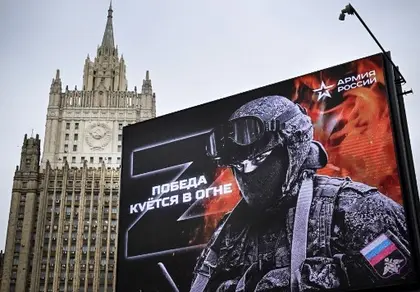Russian State Duma representatives plan to submit a bill to parliament making draft-dodging illegal. The law stipulates that draft evaders could be punished with fines ranging from 200,000 rubles ($3,250) to 500,000 rubles ($8,126), or the equivalent of 1 to 3 years’ worth of their income, forced labor, or up to five years in prison.
One of the bill’s co-authors, Ernest Valeev, claims that only those who refuse to serve in the military after receiving a draft order will be held legally accountable.
JOIN US ON TELEGRAM
Follow our coverage of the war on the @Kyivpost_official.
According to him, the bill fills a legal gap in Russian law since the country’s criminal code only punishes those who choose not to serve their country’s mandatory military service, which is a requirement for all Russian men.
The most recent mobilization campaign in Russia will not be covered by the new legislation, according to Valeev, “because it’s been officially announced that mobilization is over.”
At the same time, a decree establishing the start of Russia’s fall conscription drive has been signed by Vladimir Putin on Tuesday, Nov.1.
The draft, which is separate from the mobilization campaign that got under way on Sept. 21 and is typically held twice a year, will last until Dec. 31. The military intends to draft 120,000 people, which is 7,000 fewer than last fall.
The partial mobilization drive that kicked off on Sept. 21 has delayed the start of the fall plan by one month. On Monday, Oct. 31 Vladimir Putin declared that mobilization for the war in Ukraine was over. Although he has yet to sign a decree making its conclusion official.

Thinking Out Loud – Where We’re at, What’s at Stake, and What Ronald Would Have Said
Conscripts for the Russian military’s mandatory service will not be sent to the conflict in Ukraine, according to the General Staff of the Russian Armed Forces. According to the Institute for the Study of War, the Russian Defense Ministry is actually attempting to trick fall conscripts in order to prevent draft-dodging.
Concerns and controversies have been voiced regarding Putin’s mobilization effort. Since it was announced last month, the “partial mobilization” of Russian citizens to participate in their nation’s war against Ukraine has been plagued by missteps, sparked irate protests, and led to a mass exodus.
As of Oct. 16, Moscow and close to half of Russia’s regions had reached their draft quota.
Protests have broken out in areas with a high concentration of ethnic minorities since the president declared the drive in September, and some military enlistment offices have been set on fire. Additionally, the announcement sparked unprecedented anti-war protests across Russia.
According to reliable Russian sources, the country was compelled to tighten security at military registration and enlistment offices as a result of an uptick in attacks.
On Oct. 15, during a training exercise in the Belgorod region, two gunmen who are thought to be from the former Soviet Union opened fire on Russian military recruits, killing 11, according to a report from the Russian Defense Ministry cited by the state news agency TASS.
A member of the Russian parliament named Alexander Khinshtein claimed on Telegram back in October that numerous “intruders” had also been caught “red-handed” attempting to attack military recruitment centers.
Since the plan was made public, a large number of Russians have left the nation. In just the first week, data from those regions showed that more than 200,000 people crossed from Russia into Georgia, Kazakhstan, and the European Union.
Although there have been many obstacles to overcome, the early advantages of such a mobilization seem unclear, according to analysts.
Russia has also been accused of sending young men into combat without proper training. Even worse, it has been confirmed by numerous reliable sources over the past few months that many draftees lacked the necessary gear to fight the war.
Despite the disorganized and chaotic mobilization, Putin has supported the draft.
You can also highlight the text and press Ctrl + Enter






